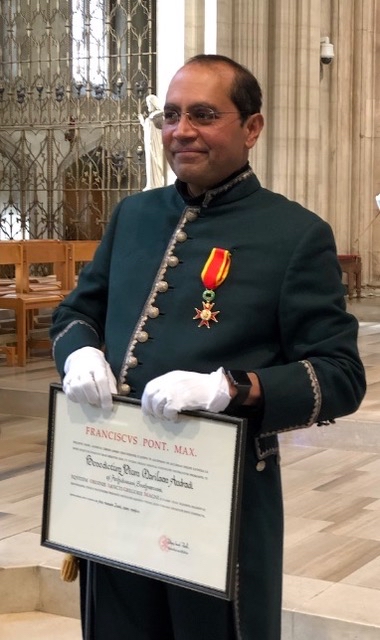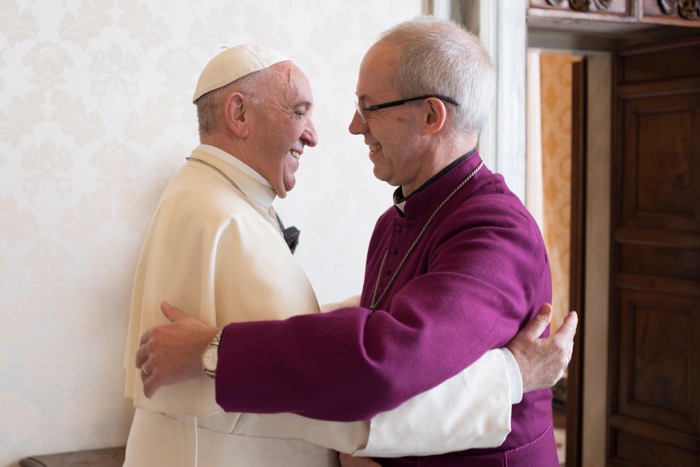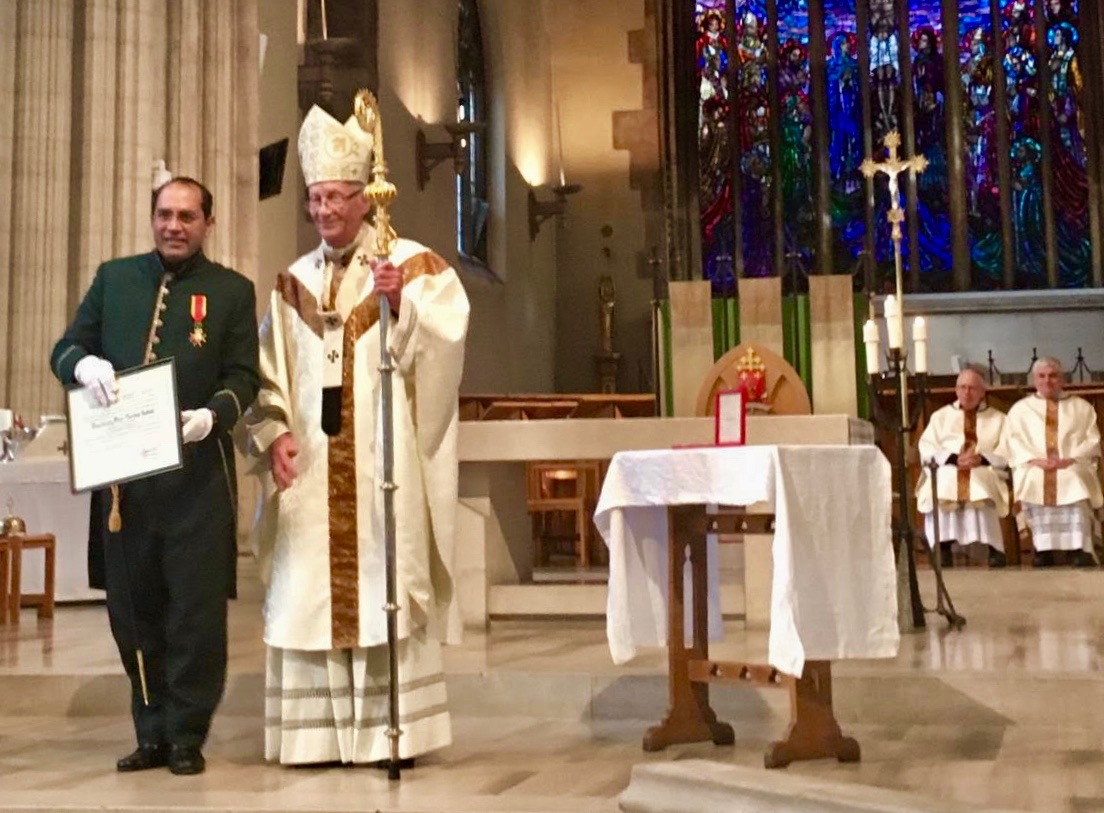On Saturday February 2 I had the pleasure of being present at the installation of Ben Andradi, Tablet director and many other fine things, as a Knight of Saint Gregory (KSG). It was performed on behalf of Pope Francis by the Archbishop of Southwark, Peter Smith, in the Cathedral.
The impression was more of jollity than solemnity – a reminder that joy should always come with a smile, and humility with good humour. The late Cardinal Basil Hume, having listened to the host of some function he was about to address heap him with praise, observed wryly that “flattery was fine as long as you don’t inhale.” (That was a sly reference to a celebrity who, on being asked on television if he had ever smoked marijuana, famously replied “yes, but I didn’t inhale”.) I saw no sign of Ben inhaling – he went so far as to say he felt he looked “ridiculous” in his knightly uniform, which was not the case.
 Ben Andradi KSG
Ben Andradi KSG
I was reminded of a conversation I had some years ago with an aide to the Prince of Wales, which clearly reflected something Prince Charles had said to him. Why did I think the British royal family received so few invitations to Catholic events, compared with other similar institutions? It is standard practice, if not in the metropolis then in Middle England (and Middle Wales and Scotland), to request a visit from royalty to inaugurate some new grand project like a hospital, school or community centre. But not among Catholics, evidently.
There is another question which I think must be related. Why are so few Catholics honoured by the Sovereign for services to the Catholic Church? It is not uncommon for lay people who have dedicated themselves to many year’s service of the Church of England to be in the running for CBEs and OBEs and even knighthoods. Why, in this case, was it unlikely that anyone had considered Ben Andradi worthy of an English knighthood instead of - or as well as - a papal one?
The only example I know of someone with both was the late Sir Sigmund Sternberg KSG, who was rightly honoured for his extraordinary contribution to Jewish-Christian relations. His status as a papal knight proved very useful at least once. There was a tricky moment in those relations when a convent of Polish nuns appeared on the outskirts of the site of the Auschwitz concentration camp, and announced their presence by erecting a prominent cross.
As many as a hundred thousands Polish Catholics had died in Auschwitz alongside a million Jews from all over occupied Europe, so their wish to pray for those souls was not unreasonable. Except that for many Jews, the cross had become a symbol of persecution - though nothing like as objectionable as the swastika - and the fact that it was so is a matter of the profoundest shame to the Catholic Church. Even after profuse apologies and repentance on the Catholic side, a cross adjacent to this extermination camp was too painful a symbol of past sufferings to be safely ignored, therefore, and various Jewish groups demanded its removal – and the nuns too, preferably.
Having failed to make contact by letter or phone, Sir Sigmund went personally to the convent with a Polish interpreter, and knocked on the door. Eventually the grill slid back and a pair of eyes peered out. He explained what he wanted to talk to them about, and the grill was slammed shut. He tried again, with much the same result. In a moment of inspiration, he took out a photograph of himself in the full regalia of a papal knight, standing next to a beaming Pope John Paul II, and posted it under the door. There was a long silence, broken by the sound of the locks being pulled back, and the door was opened. To cut a long story short, the convent no longer stands where it did.
One answer to Prince Charles, I think, is that Catholics have their own aristocracy, their bishops, and indeed their own monarch, in a purely spiritual sense, namely the Pope. And a monarch is a fount of honour – hence Ben Andradi’s KSG. I think this may tell us that while Catholics have fully accepted the sovereignty of the British monarchy in a secular sense, they have not quite done so in the spiritual sphere. And the British monarchy, in turn, may well regard service to the Church of England as service to itself, for the Queen is its Supreme Governor. Hence such service is rightly deserving of honour.
But service to the Catholic Church is service to a private institution with no legal status, except that any British monarch who tried to join it would be instantly forced, by law, to abdicate. It sounds like a trivial matter, as neither Prince Charles nor indeed his mother have ever been so inclined as far as anyone knows. But it erects an invisible wall between Prince Charles and the Catholic community. Catholics know the law would allow him to convert to Islam or Judaism if he so wished, or become patron of the National Secular Society, but there is evidently something so objectionable about Catholicism that he cannot be allowed to be tainted by it.
That is not how British royalty actually behaves, and both the Queen and the Prince have been immensely respectful towards the papacy. It is more than 80 years since a Loyal Address on behalf of the Catholic bishops of England and Wales, on the accession of George VI to the throne, was returned as undelivered to Archbishop’s House Westminster with a curt note from a junior Home Office official. That rudeness is now unthinkable.
Cardinal Hume – “my cardinal”, the Queen called him – was eventually awarded the Order of Merit, (OM), the only senior churchman of any denomination to receive such an honour. The Archbishop of Liverpool, the late Derek Worlock, was equally uniquely made a Companion of Honour (CH), which has almost the same status.
Both honours, awarded personally rather than on the say-so of 10 Downing Street, stand far beyond any mere knighthood. But this did not establish a pattern. Catholics are still not routinely honoured by the State for service to their Church. Fortunately, however, they can be honoured by the Pope instead.



 Loading ...
Loading ...
What do you think?
You can post as a subscriber user ...
User comments (0)